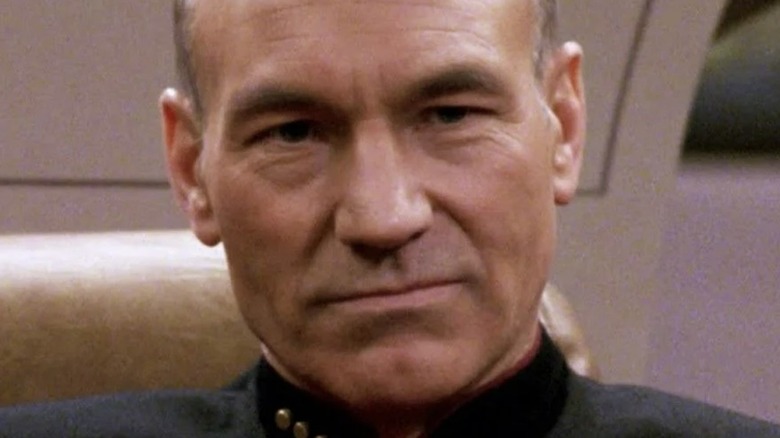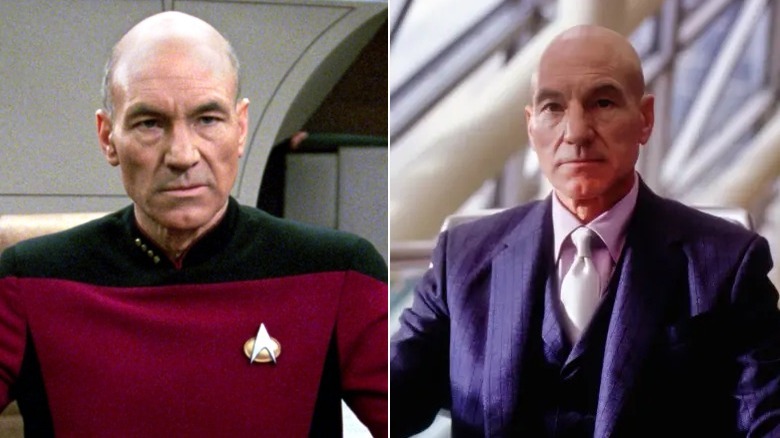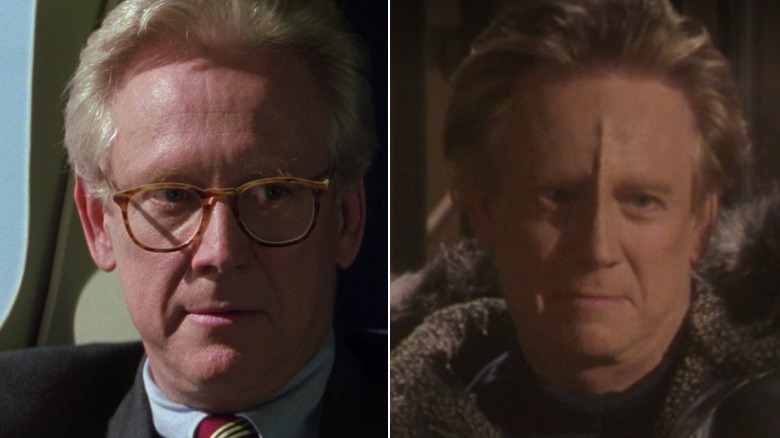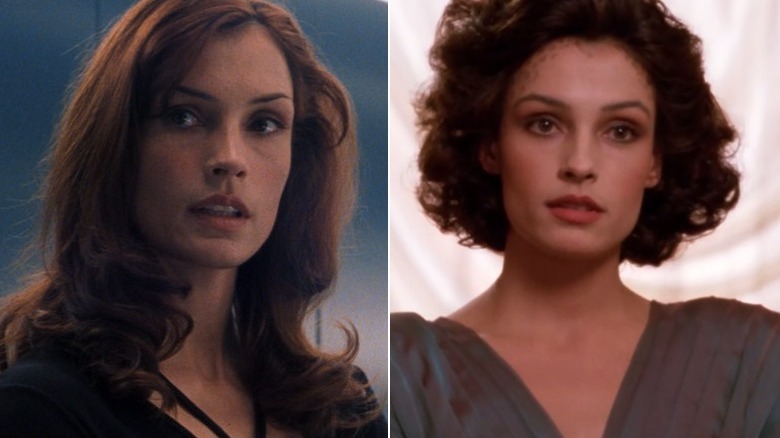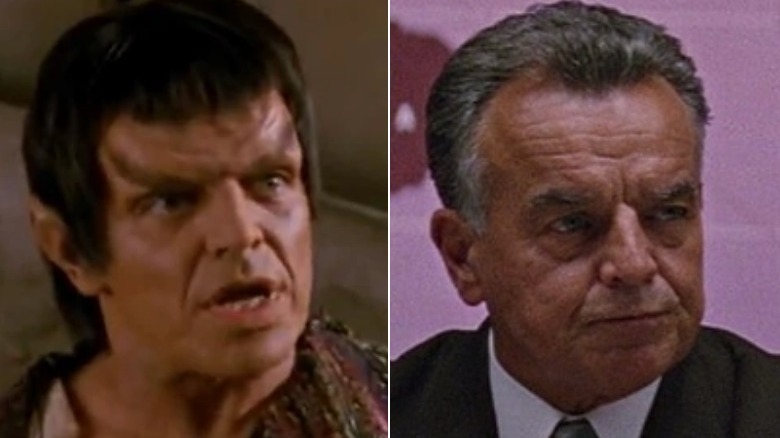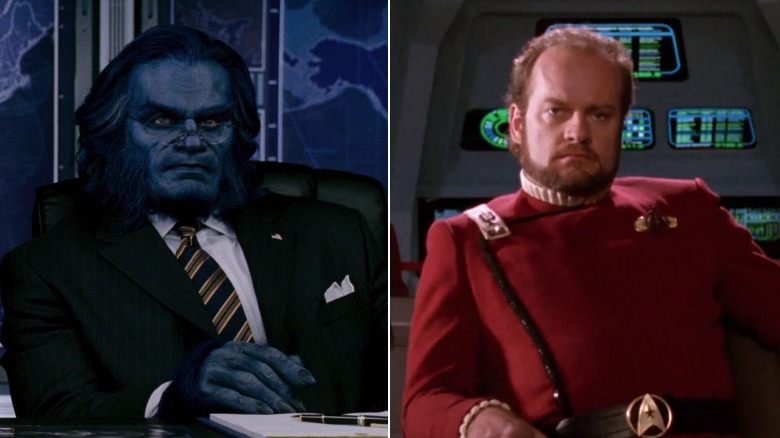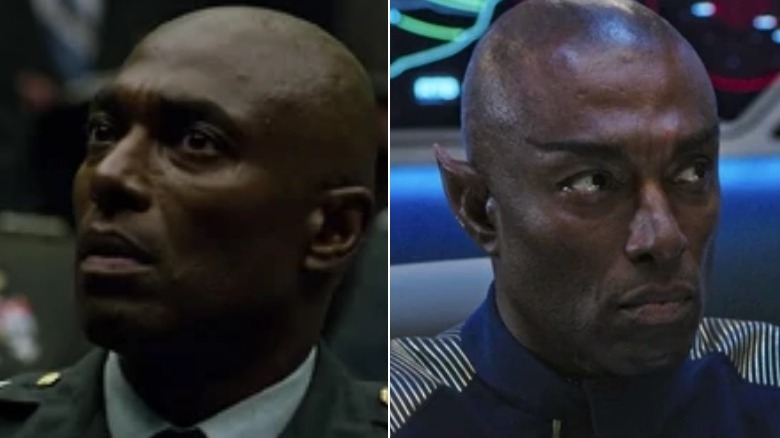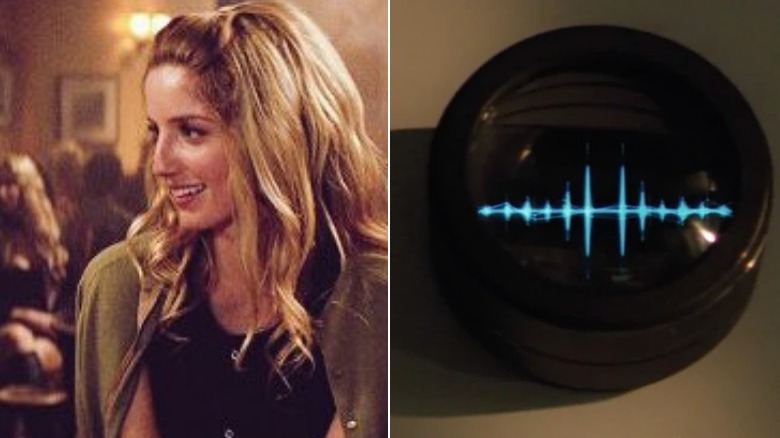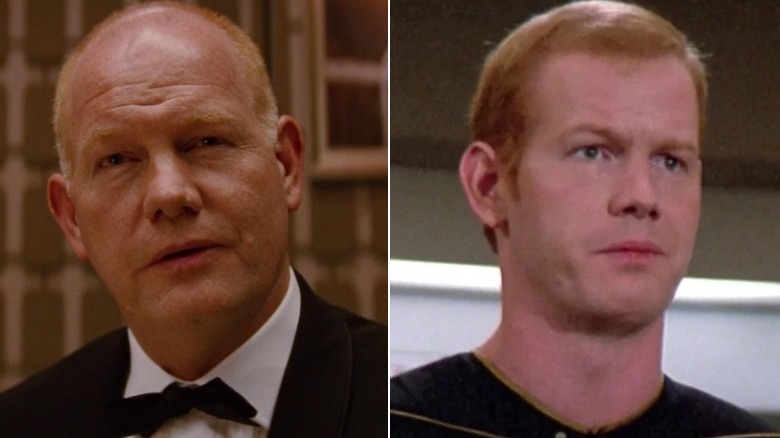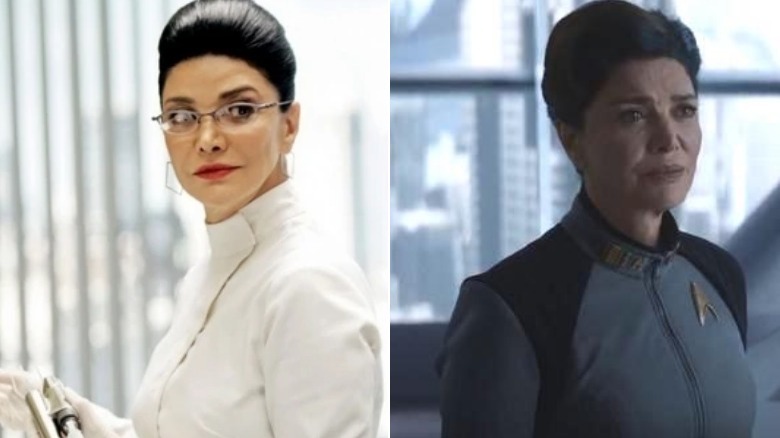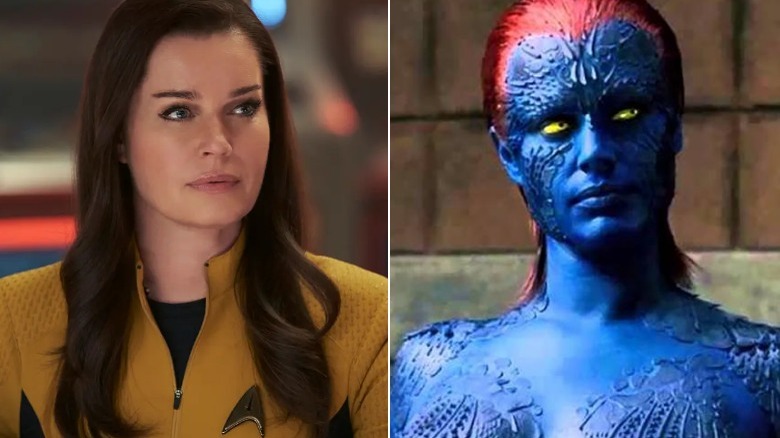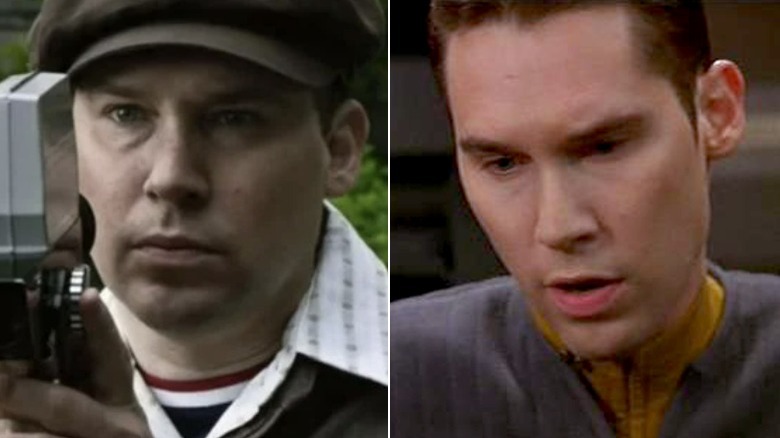The Star Trek And X-Men Franchises Are More Connected Than You Thought
One of the longest-running television franchises, with more than 10 series and over a dozen feature films, "Star Trek" is perhaps the most celebrated science fiction series ever. Across its many shows and movies a number of big-name actors have made appearances, as well as lesser-known performers that became stars thanks to serving on their respective starships. Both William Shatner and Patrick Stewart became icons after helming the Enterprise, while "Star Trek: Enterprise" picked a sci-fi veteran in "Quantum Leap" star Scott Bakula to man the titular vessel.
Before the boom in comic book movies, meanwhile, director Bryan Singer launched the "X-Men" movie franchise in 2000. Like "Star Trek" it included a mix of well-known names, complete unknowns, and emerging stars. Two sequels followed and an entire franchise was born, with Hugh Jackman's Wolverine receiving his own three-film spinoff series, and the softly rebooted "X-Men: First Class" renewing the flagship series in 2011.
Over the years, a number of actors have crossed between the worlds of starships and mutants. And it's not just the one or two you may be able to name off the top of your head. Dig a little deeper and you'll find that the connections between the two series run further than you might expect — and with new movies and shows on the way from both, we may get even more. For now though, here's a list of those actors who have jumped universes between "Star Trek" and "X-Men."
Patrick Stewart
Patrick Stewart became an iconic sci-fi hero when he slipped into the red and black spacesuit for "Star Trek: The Next Generation" in 1987. Not quite a true unknown, he had been seen by American audiences in David Lynch's 1984 epic adaptation of "Dune." But his "Star Trek" spinoff made him a household name. He starred in all seven seasons and four feature films as Captain Jean-Luc Picard, reprising the role beginning in 2020 for the follow-up series, "Star Trek: Picard." While many had doubted that anyone could replace Captain James T. Kirk in fans' hearts, he is now often seen as the best starship captain in the franchise.
Almost since the moment he came to fame in "The Next Generation," comic book fans had anointed him their choice to play Professor Charles Xavier in a big screen adaptation of Marvel Comics' "X-Men." He had the right mix of stern authority and gentle wisdom needed for the role, and his hairless head already made him the spitting image of the chrome-domed comic book character.
In the late '90s, that dream became reality when director Bryan Singer cast him in the role of the X-Men's leader. Stewart proved just as dedicated to the part of Xavier as he had been to Picard, reprising the role for two sequels and a cameo in "X-Men Origins: Wolverine" before returning in "Days Of Future Past" in 2014 and again in the Wolverine threequel "Logan." He officially joined the Marvel Cinematic Universe as an alternate reality version of Professor X in "Doctor Strange in the Multiverse of Madness" in 2022.
Bruce Davison
As Senator Robert Kelly, actor Bruce Davison was the catalyst for the struggle between mutants and the rest of humanity in the first "X-Men" film in 2000. Senator Kelly sought to pass a bill through Congress that would force mutants to register themselves and their powers with the United States government. Dubbed the Mutant Registration Act, it put Professor Charles Xavier and Erik Lehnsherr — better known as Magneto — into direct conflict over how to deal with it. Davison played the role with the kind of self-congratulatory smugness you'd expect from a Senator whose bigotry propels barbaric legislation out of a misguided sense of patriotism. At the same time, he was able to convincingly portray his motivations as understandable, if not reasonable, despite his open intolerance.
It was that kind of portrayal that made him the perfect man to play Menos, an escaped Vulcan criminal who'd been surgically altered to aid in his flight from the law in the "Star Trek: Enterprise" episode "The Seventh" in 2002. Tracked down by T'Pol and Archer, he claims he has been falsely accused. Davison's ability to play a questionable character came in handy, as he kept the audience — and T'Pol — wondering if he was really guilty.
But Davison had played a character even closer to Senator Kelly in the "Star Trek: Voyager" episode "Remember" four years before "X-Men." There he was Jareth, a government leader who wanted to crack down on a group of non-violent luddite dissidents, eventually wiping them out in a so-called "resettlement" that was actually a racial holocaust.
Famke Janssen
The 2000 film "X-Men" launched the careers of a number of actors, including actress Famke Janssen, who became more widely known thanks to her turn as the telepathic mutant Jean Grey. Far from the usual comic book damsels that had become common, Janssen played Jean Grey as a strong leader in her own right, much to the chagrin of many fans who might have expected her boyfriend Scott Summers — aka Cyclops — to take the spotlight. A mutant with powerful psychic abilities, she was also at the heart of a love triangle between Logan, Scott, and her. She'd return to play the part in both sequels, plus make a cameo at the end of "X-Men: Days Of Future Past," while leveraging her newfound fame to secure roles on TV hits like "Nip/Tuck," "The Blacklist," and, more recently, "How To Get Away With Murder."
Before "X-Men," Famke Janssen was mostly known as assassin Xenia Onatopp in Pierce Brosnan's first 007 adventure, "Goldeneye," but several years earlier she'd made her mark on the "Star Trek" franchise as well. In the Season 4 episode "The Perfect Mate," she played the mysterious alien woman Kamala. In the episode the Enterprise is hosting peace talks between two warring worlds, and the leader of one arrives with Kamala in stasis as a peace offering to the opposing leader. Kamala is ironically enough described as a mutant, with the ability to become the perfect partner for her eventual mate, to whom she will be bonded for life.
Ray Wise
Best known to audiences for his role as Leland Palmer in David Lynch's cult phenomenon "Twin Peaks," Ray Wise is a renowned character actor who has appeared in dozens of hit shows and movies. Some of his bigger work has included playing Vice President Gardner in "24," plus recurring roles on "Knots Landing," "L.A. Law" and "Dallas." Often playing — no pun intended — wise and powerful characters, he was cast in "X-Men: First Class" in 2010 as the United States Secretary Of State.
Before he was even known for his role in "Twin Peaks" though, Ray Wise appeared on "Star Trek: The Next Generation" during the show's third season. In "Who Watches The Watchers," Wise played Liko, a village leader on a planet populated by a pre-warp drive civilization. In the episode, Liko unwittingly becomes aware of the crew of the Enterprise, and Patrick Stewart's Captain Picard in particular, who he comes to believe is a god. It's then up to Picard to undo the cultural damage. A few years later, Wise would pop up on "Trek" again, this time in the "Star Trek: Voyager" fourth season finale "Hope And Fear." He plays an alien named Arturis, whose people are assimilated by the Borg thanks to Captain Janeway's alliance with them in a previous episode. In the finale, he tricks Janeway into thinking the Federation has found a way to bring them home as a ruse for revenge.
Kelsey Grammer
Actor Kelsey Grammer played acerbic psychiatrist Frasier Crane for nearly a decade on the hit '80s sitcom "Cheers" before graduating to his own series, "Frasier," which lasted throughout the '90s and early 2000s. After cementing himself as one of television's biggest names, Grammer joined the "X-Men" franchise in 2006 in the series' second sequel, "X-Men: The Last Stand." There he played longtime X-Man and original founding member (in the comics) Hank McCoy, aka Beast. Under heavy blue makeup, he finally gave fans one of the most beloved mutants that they had been clamoring for, playing the character to perfection as an intellectual, scientist, and wry observer of human nature, not unlike Fraser Crane.
But more than a decade-and-a-half earlier, when Grammer was still starring on "Cheers," he showed up in a guest-starring role on "Star Trek: The Next Generation." In the fan-favorite episode "Cause And Effect," the Enterprise is forced to repeat a loop of time until the crew can solve the problem and get out of it. When they do, they discover the centuries-old starship USS Bozeman, which had similarly been trapped in a repeating time loop. In the final moments of the episode, Grammer appears on the Enterprise's viewscreen as the Bozeman's captain, Morgan Batesman, and Picard must explain that he has been brought forward nearly a century in time.
Conrad Coates
Though you might not recognize the name Conrad Coates, you almost certainly have seen him. The journeyman actor has had roles on any number of major shows and movies, including parts in sci-fi franchises like "Tron Legacy," "The Expanse," "Defiance," "La Femme Nikita," and "Percy Jackson And The Olympians: The Lightning Thief." He's been seen in movies and TV shows as far back as the 1980s, but it wasn't until 2016 that he landed a role in a major comic book movie, "X-Men: Apocalypse." There he played General Fields, a military official at the Pentagon when the ancient evil mutant Apocalypse returns to wreak havoc.
Though his part in "X-Men: Apocalypse" wasn't a big one, he had a bigger recurring role on "Star Trek: Discovery" just a year later. He appeared in four episodes of that show's first season as the Vulcan Admiral Terral, a high-ranking Federation official serving during the Klingon war. In several episodes the USS Discovery reports to Terral, who on one occasion denies Captain Lorca permission to rescue Ambassador Sarek, issuing orders for the ship to retreat from Klingon territory. Despite defying orders more than once, Captain Lorca is commanded by Terral to head to Starbase 46, where he is to be awarded the Legion of Honor for his actions during the war.
Annabelle Wallis
Like Conrad Coates, actress Annabelle Wallis has made a name for herself portraying major recurring characters on hit TV series. Wallis has made regular appearances on shows like "Pan Am," "The Tudors," and "Peaky Blinders," where she played Grace Burgess, an agent of the Birmingham Police who went undercover as a barmaid at the Garrison Pub. She had a brief but memorable role in "X-Men: First Class" as a woman named Amy, who chats up Professor Charles Xavier at a local pub. In the scene, Xavier points out that her heterochromia, which causes her to have differently colored eyes, technically makes her a mutant. Mystique, annoyed by the attention he is giving her, mimics the same condition to distract from their obvious flirtation.
Over on "Star Trek: Discovery," Wallis did not appear in front of the camera, but voiced the artificially intelligent starship computer program aboard the USS Discovery that eventually became known as Zora. First appearing in an episode of "Short Treks" titled "Calypso," alongside Aldis Hodge, she has since reprised the role on "Discovery" for a total of 13 episodes through the third and fourth seasons of the series, with her program continuing to evolve. As "Calypso" took place in a future where the ship had been abandoned for a century, it is yet to be revealed how Zora wound up alone in space aboard the Discovery, or why the crew seemingly deserted her.
Glenn Morshower
Actor Glenn Morshower has had a long career in TV and movies, often playing military commanders. He might be best known to viewers for his role in "24" as Secret Service Agent Aaron Pierce, showing up in more than 50 episodes of the series. But he also popped up in the "Transformers" series as a general also named Morshower, along with military roles in "Black Hawk Down," "Pearl Harbor," and "Under Siege." In 2011 he joined "X-Men: First Class" in the role of Colonel Robert Henry, a corrupt military official who works with Sebastian Shaw to orchestrate the Cuban Missile Crisis in an attempt to spark World War III.
In his first-ever television appearance, Morshower filled the role of Ensign Burke in the "Next Generation" Season 2 episode "Peak Performance," replacing Worf at the horseshoe station when the Klingon officer leaves to assist Commander Riker in a war game exercise. But that's not Morshower's only "Trek" role, as he also appeared in the film "Star Trek: Generations" as a navigator aboard the USS Enterprise-B, an alien guard in an episode of "Voyager," and the villainous Orton in the "TNG" episode "Starship Mine." He had his biggest "Star Trek" role in an episode of "Enterprise" in 2003. There he played Sheriff MacReady in "North Star," a frontier lawman on a backwater planet settled by humans from the 19th century that still resembled the Wild West.
Shohreh Aghdashloo
Best known for her role as Chrisjen Avasarala on the sci-fi series "The Expanse," Aghdashloo, like Glenn Morshower, had a key recurring role on "24," as well as a major, Emmy-winning turn in the HBO series "House of Saddam." In 2006 she appeared in the third film in the "X-Men" series, "X-Men: The Last Stand," as Dr. Kavita Rao, a genetic scientist who works at Worthington Labs. She helps develop the "mutant cure" at the heart of the film's story. While some mutants see the serum as a blessing, others like Magneto and his followers view it as a way for humanity to wipe them out. In the film's climax, Rao is killed by one of Magneto's men, the mutant known as Quill, for her part in the cure's creation.
In "Star Trek Beyond," the third in the rebooted series of films for the franchise, Aghdashloo plays a high-ranking Starfleet flag officer, Commodore Paris, who commands the starbase Yorktown. In the film, Captain Kirk reports to Paris at the starbase and submits an application for an open Vice Admiral position. While he's there a crisis erupts, and he volunteers to take the Enterprise on a rescue mission. Following the crew's battle with the villainous Krall, Kirk again meets with Paris, who says his promotion is all but secured given how he just saved the entire Federation. Instead, Kirk informs her he wishes to remain captain, not yet ready to say goodbye to his days commanding the Enterprise.
Rebecca Romijn
In the 1990s actress Rebecca Romijn may have been best known for being married to sitcom heartthrob John Stamos, but all that would change when she was cast as the mutant villain Mystique in the 2000 film "X-Men." The nearly-naked, all-blue shape-shifting baddie quickly became a breakout role for the actress, as her sultry, sinister persona made her a scene-stealer. Featured in the first film's most memorable fight scene with Hugh Jackman's Wolverine, she was an unforgettable part of the "X-Men" film saga. She returned for both sequels, and came back for a cameo in a scene in "X-Men: First Class" where the younger version of Mystique shapeshifts into an older woman to appeal to Michael Fassbender's Magneto.
After taking starring roles in TV series like "Ugly Betty," "Eastwick," and "The Librarians," Rebecca Romijn joined "Star Trek: Discovery" for its second season in a small recurring role as Captain Pike's first officer aboard the USS Enterprise. A character that was initially played by Gene Roddenberry's real-life wife Majel Barrett in the original "Star Trek" pilot episode "The Cage," Romijn took over the role in three episodes of "Discovery." In 2020 it was finally announced that Romijn — alongside actors Anson Mount and Ethan Peck (who played Captain Pike and Mr. Spock, respectively) — were getting their own spinoff series set aboard the Enterprise, "Star Trek: Strange New Worlds," that launched in May of 2022.
Bryan Singer
While many actors connect the "Star Trek" and "X-Men" franchises, another name also ties them together: director Bryan Singer. While he may be a complicated figure today in light of allegations of misconduct, in the late '90s he was an up-and-coming filmmaker who had already delivered critically acclaimed features like "Apt Pupil" and "The Usual Suspects." Perhaps an unusual choice to helm a comic book film, his eye for strong storytelling and compelling character work served the first "X-Men" movie well and brought an air of respectability to the project.
While Patrick Stewart had long been a fan favorite for Professor X, his casting may have been at least partially due to the fact that Singer was a big fan of "Star Trek." Such a fan was he that in 2002, thanks to Stewart, he secured a role in the 10th "Star Trek" film, "Star Trek: Nemesis." The perfect compliment to his three uncredited cameos in "X2: X-Men United," "X-Men: Apocalypse," and "X-Men: Days Of Future Past," he played Lieutenant Kelly in "Nemesis," a tactical officer aboard the USS Enterprise-E.
But Singer's connection to "Star Trek" doesn't end there. In the mid-2000s, with the sci-fi franchise struggling on TV and in theaters, Singer had his own ideas about how to revive the series. Alongside Christopher McQuarrie, Singer developed his own pitch for a new "Star Trek" series titled "Star Trek: Federation." Eventually however, Paramount would pivot to a feature film reboot instead, hiring J.J. Abrams for 2009's big-budget "Star Trek."
